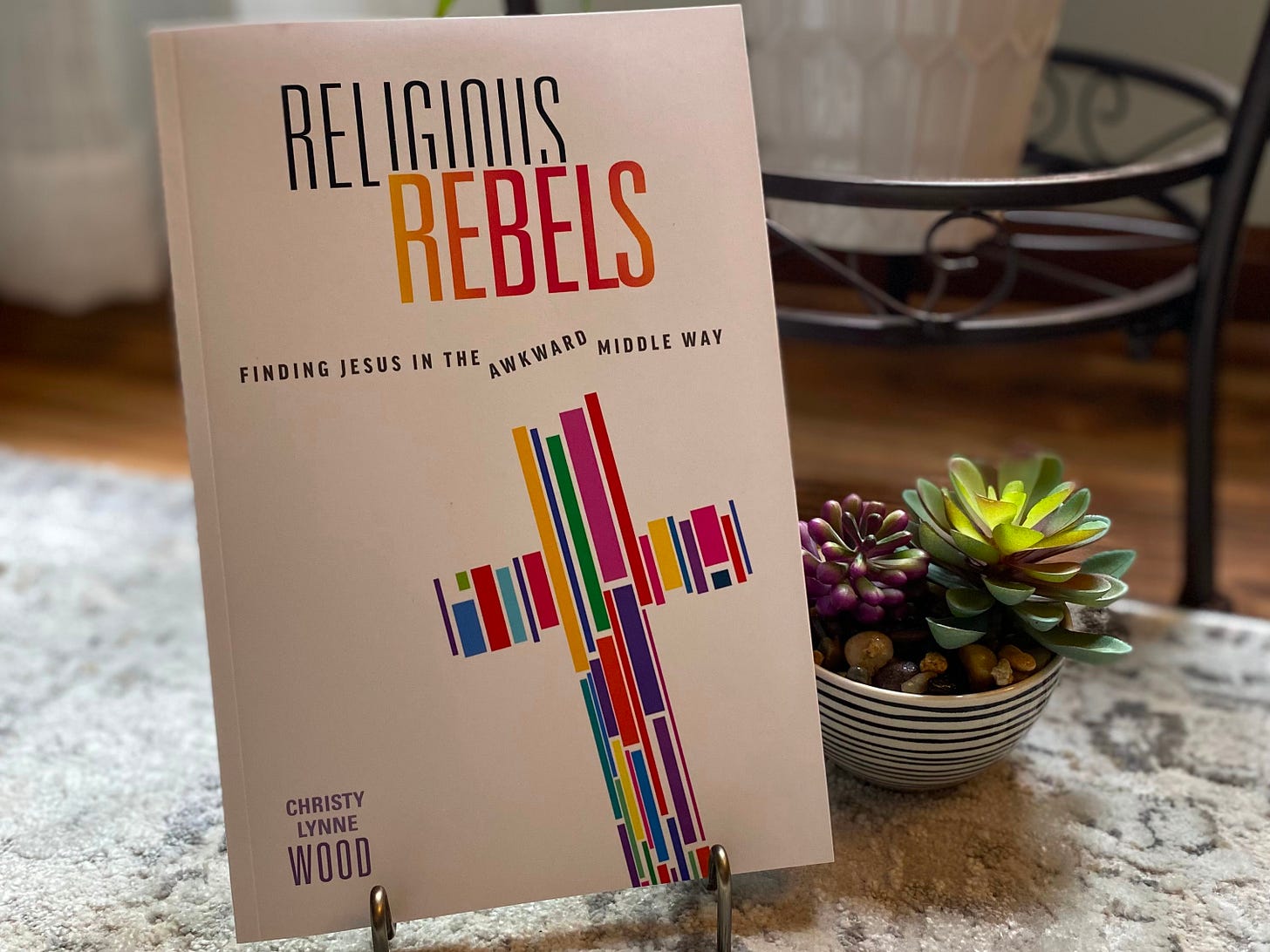Rethinking Faith: Problems, Podcasts, and Ponderings
This month we will question glaring problems within American evangelicalism, explore important books and podcasts, and ponder connections between the Adam and Eve, Jesus, and the modern church.
Rethinking Faith: May 2025
Welcome to the May issue of Rethinking Faith. This month we will question some glaring problems within the American evangelical church and wonder why we ignore them, explore some important books and podcasts, and ponder an interesting connection between Adam and Eve, Jesus, and the modern church. Thanks for being here!
Acknowledging Problems within American Evangelicalism
Last week I sat in church, and instead of listening to the sermon, I made a list on my phone. The more I learn about the history of American evangelicalism in the past seventy or so years, and the more I watch what is happening in many current evangelical churches and evangelical culture at large, the more I am sure that something is deeply broken. And it cannot be fixed until we acknowledge it.
I’ve gone through four seasons of faith deconstruction and reconstruction where I’ve rethought theology, topics, scripture, and more, and yet I’m still technically an evangelical in the global sense. I’m not a burn it all down kind of person, mostly because I’ve watched too many people become ex-evangelicals and take all of the heart level junk right with them into their new worldview and set of beliefs. And because, despite everything, I still see goodness in the evangelical movement.
Don’t get me wrong, there is plenty of badness too. Like the leven of the Pharisees that Jesus warned about, we’ve unfortunately spent years letting the badness seep into everything. We’ve gone too long without taking a critical look at the false teachers and wolves in our midst. We’ve accepted some awfully unholy alliances and then made excuses for them. It’s not okay, and now we are reaping the results.
So friends, here is the list that I made last Sunday. Here is where things have gone wrong. but here is where repentance starts. This is going to be a rant today, so be warned. I’m more concerned with the heart I have than the perfect English words I write.
Thoughts on the Problems within American Evangelicalism:
This list is not in any particular order. I’m not trying to lay out an organized argument. I’m trying to get your own brain working. Where do you see these things alive and well? And what can we personally do to repent of and reject them? Here we go.
We’ve tried to fix things in our own efforts through moralism, politics, excessive rules, etc. for the last 60+ years. I’ve mentioned many times before that it seems evangelicals either ignore the Holy Spirit or try to manipulate him depending on which denomination you attend. Since we aren’t being transformed by the Spirit from the inside out, I think we feel the need to force change from the outside in. The problem is, it doesn’t work that way. Sometimes I swear we don’t even understand the gospel. Do we even know why Jesus came? Maybe that’s the real problem.
We are quick to turn everything into a capitalistic venture: seminars, rallies, books, trainings, merch, etc. Do I even need to comment on this one? Why do we feel the need to monetize everything? Why do we feel the need to constantly produce? There is something deep here that we need to acknowledge, talk to the Holy Spirit about, and repent of for sure!
We idolize people (from history and modern culture).
comments on this in her excellent book The Evangelical Imagination which I am going to read again this summer. Evangelicals have always been about heroes of the faith. And when we tell the stories of our heroes, we tend to gloss over their human faults and turn them into super-Christians. We do this with people who are still alive too: pastors, authors, leaders, speakers. Why? Where is this idolization coming from? Why do we need larger-than-life people to look up to? Is it from our own insecurity and misunderstanding of the gospel? Our own lack of Holy Spirit transformation? Our pride?We always think we are more right than “other Christians” or the world. Speaking of pride, what is up with this? I remember as a child hearing people talking about liturgical churches condescendingly, as though they weren’t really Christians. The liturgy—which I now find comforting—was dismissed as unauthentic. And don’t get me started about worldly people. We were obviously better informed, better humans, and more acceptable to God than anyone else. They were sinners, and we followed the rules. Our sin was hidden better. We got so good at hiding it that I think some of us forgot it was there at all. This attitude from my cult days is sadly prevalent in mainstream evangelical churches too. There is SO MUCH pride within the American evangelical movement. And I wonder if that pride is at the root of my next point.
Does our attitude of “rightness” keep us from questioning ourselves, our teachings, and our leaders? If we assume that we are always right, then why would we ever stop to question anything? We’ve accepted terrible teachings, dangerous leaders, and faulty theology over the years that has caused massive destruction in the lives of people. I honestly wonder if this supposed rightness is why hitting a season of faith deconstruction is so devastating to some former evangelicals. When you spend your whole life believing that you are the only ones who are right and then discover glaring things that are wrong, it can be disorienting.
Because we also refuse to criticize our leaders but are quick to criticize everyone else. There is almost an agreement within evangelical culture that we don’t criticize our own leaders/teachers. It’s probably because we don’t want to ruin God’s reputation or something like that (which is bogus), but as a result we’ve allowed wolves in sheep’ clothing to ravage the church. Terrible theology, abuse of power, and abuse of people have run rampant while we avert our eyes. At the same time, we are quick to criticize each other, those on the outside of church, people who are different from us, and anyone who isn’t following the rules we follow. We give way too much grace to fallen leaders and none at all to the broken people who actually need it. It makes me want to cry.
We withdraw into our own culture and then live in this bubble world without seeing the blind spots or issues. (Christian schools, colleges, companies, churches, etc.) I can’t help but wonder if we don’t see the problems within evangelicalism because we are surrounded by a Christian cultural bubble. The outside world seems scary, so we hide inside with people who are like us. But if we never leave the bubble, we won’t have an accurate perspective on the world or how we come across to others. Jesus didn’t live in a bubble. He ate and drank with sinners, loved the world, and made the religious people angry and uncomfortable. Which side of the story are we on? It’s a valid question.
We have made unholy alliances with people who have what we want or to get what we want. The more I learn about what has happened and continues to happen within the upper echelons of American evangelicalism, the more certain I am that many decisions and moves were made specifically as power grabs. It’s more calculated than we want to admit. I’ll talk more in the next section, but three specific podcasts have laid out evangelical history in a way that I can’t ignore. I’m especially horrified by two situations I’ve discovered. First, Dr. Paige Patterson and Judge Paul Pressler’s years-in-the-making takeover of the SBC in the Conservative Resurgence that was fueled by their intentional focus on the “inerrancy” of scripture. And second, the connection between Loren Cunningham, founder of Youth With a Mission, Bill Bright, founder of Campus Crusade for Christ, and theologian Francis Schaffer in coming up with the Seven Mountain Mandate. The mandate is an unscriptural, Christian dominionist teaching that lays out seven mountains of culture that Christians need to take over in order to secure the return of Jesus. It is directly related to the rise of Christian Nationalism that we are currently experiencing. This brings me back to the issue where we don’t take careful and critical looks at the leaders and teachings in our midst.
We are filled with pride, we love the things of the world, we don’t love people, and we don’t know Jesus. But we think we do! I will be talking more about this in the last section of this letter and in greater detail next Sunday. I am increasingly certain that American evangelical culture has more in common with the religious leaders of Jesus’ day than it does with Jesus or his rag tag band of disciples.
If this feels uncomfortable, I think that’s a good thing. I don’t write this so that we can point fingers at those bad evangelicals over there. I write this so we can look into ourselves, acknowledge, repent (change our minds), and ask the Holy Spirit to help us change our hearts.
Culturally Important Podcasts and Books
I just got back from a Washington DC trip with my daughter’s 8th grade class. The thirteen hour bus ride was tortuous, but it gave me plenty of time to catch up on podcasts. I finished the rest of Mike Cosper’s Devil and the Deep Blue Sea, listened to a couple of Beth Allison Barr’s All the Buried Women, and started Ruth Braunstein’s When the Wolves Came. They were all excellent. Lots of information and a bit overwhelming at times, but they were definitely worth the listen.
These podcasts, and others like them, give us the background and the missing history we need to make the world we are living in make sense. When we hear about what just happened in the 60s and 70s and then the 80s and 90s, the things we are living through in 2025 fall into place. I don’t love what is going on, but I know how we got here. Hopefully once we understand, we can catch a glimpse of ways to move on.
Also, if you have not yet read Kristen Du Mez’s book Jesus and John Wayne, it is worth a read or listen. While I didn’t always totally agree with her perspective, the history can’t be refuted and needs to be known. And finally, Karen Swallow Prior’s The Evangelical Imagination helped me to see that many things we evangelicals consider to be “biblical” are actually Victorian tradition coupled with a romanticized view of history. Again, a book worth reading and filled with information we need to know if we are going to change.
The Lust of the Flesh, The Lust of the Eyes, and the Pride of Life
“Do not love the world or anything in the world. If anyone loves the world, love for the Father is not in them.
For everything in the world—the lust of the flesh, the lust of the eyes, and the pride of life—comes not from the Father but from the world”
1 John 2:15-16.
I was pondering this verse one night during the Washington DC trip when I couldn’t sleep. As I thought about it and contemplated the podcasts I’d been listening to, it hit me that American evangelical culture—from media industries to mega-churches to political identity—has bought into every one of the things John warned about. Then I remembered the temptation of Jesus in the wilderness. He was offered food when he was hungry, a chance to be spectacular, and worldly power. The arrangement was a little different, but the temptations he experienced reminded me of the things in the world from 1 John 2:16.
I wondered if I was crazy to connect the two passages of scripture, so the next morning I googled it. Other people had also seen similarities, and they even went so far as to connect the temptations of Jesus to the original temptation in the Garden of Eden. Adam and Eve saw the fruit was “was good for food and pleasing to the eye, and also desirable for gaining wisdom” (Gen 3:6) and they listened to the evil one and ate it.
Next week I am going to dedicate my whole Substack to exploring the connection and how the evangelical culture here in America has failed the temptation test. I’m going to challenge each of us to ask the Spirit to search our hearts and reveal the places where we love the world so that we can change our minds and chase after Jesus instead.

My goal in this week’s newsletter is not to condemn evangelical culture at large so that we can feel better about ourselves. Many of us participated willingly for years. Many of us have only recently had our eyes opened through a deconstruction journey. It’s not enough to point fingers, change political beliefs, and sit in our anger. The junk I’ve talked about, the tricky lies, and almost true ideology, twists itself into our hearts. We need to deconstruct the deep things—the motivations, underlying assumptions, and religious perspectives—to truly be free.
The good news is that Jesus loved the religious leaders just as much as he loved the tax collectors, prostitutes, and sinners. His designed his questions and corrections to nail them in the heart. It was in his nighttime conversation with the Pharisee Nicodemus that Jesus said, “For God so loved the world that He gave His one and only Son, that everyone who believes in Him shall not perish but have eternal life. For God did not send His Son into the world to condemn the world, but to save the world through Him. Whoever believes in Him is not condemned, but whoever does not believe has already been condemned, because he has not believed in the name of God’s one and only Son” John 3:16-18. That’s good news for all of us!
As always, I'd love to hear your thoughts, questions, or comments. You can find me on Threads, Instagram, Facebook, in the Substack app, and on my website. I’d love to connect with you on any of these places!
My podcasts, Religious Rebels and Looking for the Real God can be found here on Substack, and on YouTube, Apple Podcasts, Spotify, iHeart Radio, and anywhere you listen to podcasts.
You can order an autographed copy of my book, Religious Rebels: Finding Jesus in the Awkward Middle Way by clicking on the button below. Or you can find it on Amazon.












"We’ve tried to fix things in our own efforts through moralism, politics, excessive rules, etc. for the last 60+ years… Do we even know why Jesus came? Maybe that’s the real problem.”
I do think we’ve for sure created a culture war with non-Christians we shouldn’t have. I became a Christian when I was sixteen, and while I don’t regret it for one minute, I do wish that the people who fostered that relationship with Jesus made it less about winning the culture war and more about loving God and our neighbor.
At least here in the US, we’ve made laws in an effort to win the culture war against non-Christians. We either don’t know or simply ignore that the Bible is OUR playbook, not the world’s. We try to legally mandate people who don’t believe in it or Jesus to live by the Bible instead of living by it ourselves and loving people. So no, I DON’T think we know why Jesus came, since so many of us see or have seen Jesus as a way to have power over the people we’re supposed to be loving.
>>There is almost an agreement within evangelical culture that we don’t criticize our own leaders/teachers. It’s probably because we don’t want to ruin God’s reputation or something like that (which is bogus),
I'm not so sure it's because we don't want to ruin God's reputation as much as we've been taught that we aren't to "touch God's anointed." Here's where the model of church we follow is a huge problem. Leadership of churches in New Testament times was far different than what we have today. It wasn't centered on one man. And their gatherings looked far different than ours, too.
I mentioned Frank Viola earlier. He recently released his book, The Untold Story of the New Testament Church, revised and expanded. In addition, he put together 10 YouTube videos (about 10 minutes each) that tell the entire story of the New Testament with sketchbook-type visuals. I can't recommend this book, Frank's podcasts (Christ is All and The Insurgence), and these videos enough. I believe that until we, the Church, recognize that God isn't going to change His mind about what He intended — His eternal purposes — we will forever be floundering as we try to follow Jesus in the middle of a truly messed-up model of church, which, sadly, is all that many of us have ever known. {sigh}
But all is not lost! Far from it! This is where you and I and many others speaking out come in. Do you follow @MaryDeMuth here? If not, check her out. You definitely need to. She recently spoke at the Restoration 2025 conference and posted a link to it.
This is all I have time for today. I'm grateful for what you're sharing. It's important. Don't ever stop!
Here's the link to the 1st Video Podcast in the series: https://youtu.be/uhP40BaFjdE?si=9QesshVr9k_MCUYd